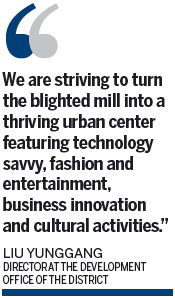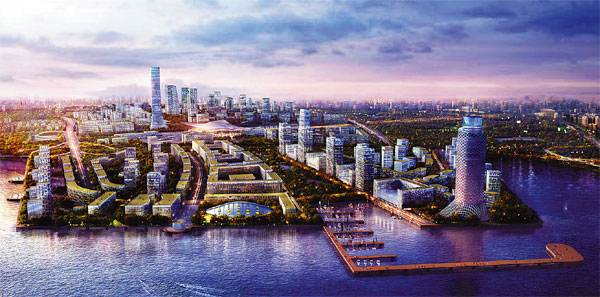Textile factory transformed into virtual reality park
To preserve and make full use of local culture and history, the Qingdao Traffic Business District authority renovated the century-old, State-owned No 6 Cotton Textile Factory into the M6 Virtual Reality Industrial Park, which has 16 virtual reality programs.
"As well as business, we also cherish our culture, history and traditions as they are not only our invaluable wealth but also the humanistic foundation that can elevate the soft power of this area," said Liu Yungang, director at the development office of the district.
The former textile factory was built on the industrial heritage site and its original structures have been preserved.
Many of the old buildings were renovated and expanded in the original architectural style.
The textile museum displays some of the plant's oldest machines, pictures and other documents, which tell the past glory of the industry in Qingdao.
Since the park opened it has hosted a number of cultural activities including a sculpture exhibition, a sculpting competition, a photograph show and a painting exhibition dedicated to female artists.

"We are striving to turn the blighted mill into a thriving urban center featuring technology savvy, fashion and entertainment, business innovation and cultural activities," Liu said.
Sprawling across 130,000 square meters, the park is designed to attract digital technology, culture and entertainment companies as well as consultancies and other services.
To date, 24 companies have settled in the park.
The first phase of the park was completed in 2012 and includes a 1,000-sq-m textile museum, an 800-sq-m virtual reality science exhibition center and a 4,500-sq-m virtual reality experience center.
At the experience center, visitors can operate a high-speed train in a simulation machine.
Other attractions include plane and spacecraft simulators, a virtual car assembly platform and a virtual online garment shop.
More than 10 companies involved in virtual technology have signed agreements to move into the park.
An art gallery, a wedding service company, a landscape design academy and several digital animation companies have already moved to the park.
A hotel, serviced apartments, private clubs, restaurants, a leisure park, a financial product "supermarket" and a transaction center for technology and cultural products are due to be built in the park.
"It's virtually a city within a city - entrepreneurs can find a variety of necessary services in the park," said Liu.
The technology and cultural product trade center helps companies commercialize their innovations and apply them in real life.
The park also offers low-cost office space and plant to promising startups, providing an incubation platform for small-and medium-sized enterprises.
xiechuanjiao@chinadaily.com.cn
|
Shown here is the core area of Qingdao Traffic Business District, which combines Shandong's largest transportation hub with surging business. |
(China Daily 11/12/2014 page12)















